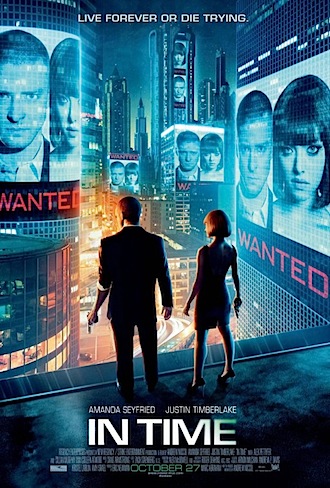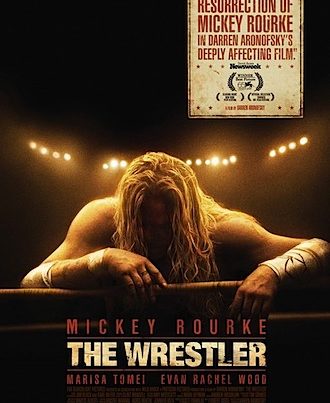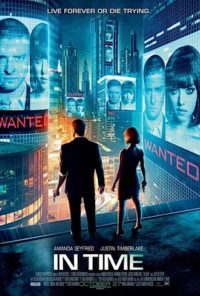 Expat Kiwi auteur Andrew Niccol (Gattaca) somehow always manages to tap in to the zeitgeist and with new sci-fi thriller In Time his own timing is almost spookily perfect. A parable about the modern political economy, In Time isn’t a particularly sophisticated analysis but while protestors occupy Wall Street, St Paul’s in London and the City to Sea Bridge here in Wellington, it seems almost perfectly calculated to provoke a big Fuck You! to the bankers, speculators and hoarders who are rapidly becoming the Hollywood villains we love to hate.
Expat Kiwi auteur Andrew Niccol (Gattaca) somehow always manages to tap in to the zeitgeist and with new sci-fi thriller In Time his own timing is almost spookily perfect. A parable about the modern political economy, In Time isn’t a particularly sophisticated analysis but while protestors occupy Wall Street, St Paul’s in London and the City to Sea Bridge here in Wellington, it seems almost perfectly calculated to provoke a big Fuck You! to the bankers, speculators and hoarders who are rapidly becoming the Hollywood villains we love to hate.
In Niccol’s world, several decades into the future, time is literally money: human beings have been genetically modified to stop (physically) ageing at 25. Which would be lovely apart from the fact that a clock on your writst then starts counting down the one year you have left to live and the time on your wrist becomes currency. You can earn more by working, transfer it to others by shaking hands, borrow more from banks and loan sharks or you can spend it on booze to blot out the horror of your pathetic little life.
Justin Timberlake has been getting by in the ghetto for three of his 25+ but when a mysterious man gives him 100 years before suiciding off a bridge (and his mother dies because the bus fares have gone up) he is fired up to investigate and then correct this obvious injustice. The super-rich are hoarding time for themselves and becoming immortal and the 99% are slowly dying off because of artificial shortages created by those who own the means of production.
Despite all that, In Time isn’t very successful, largely because it’s full of holes and doesn’t go fast enough to prevent those “Hold on, what?” moments that drop you out of Niccol’s world. So, while one hopes that all those kids who have never heard of Marx (Karl, Groucho or Richard) get to see In Time and rise up against the bourgeoisie – or at least vote – I fear the film isn’t quite good enough to start a revolution.
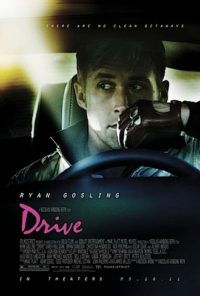 A film that would definitely be good enough, if only it was about something other than existential ennui and the utter pointlessness of making plans, is Nicolas Winding Refn’s Drive. This generation’s Brando, Ryan Gosling, becomes this generation’s Ryan O’Neal as a nameless Hollywood stunt and getaway driver who falls for his beautiful neighbour (Carey Mulligan) and her son and, in attempting to protect them from harm, comes between a bunch of “belligerent assholes with their backs against the wall” (Albert Brooks and Ron Perlman) and a million bucks.
A film that would definitely be good enough, if only it was about something other than existential ennui and the utter pointlessness of making plans, is Nicolas Winding Refn’s Drive. This generation’s Brando, Ryan Gosling, becomes this generation’s Ryan O’Neal as a nameless Hollywood stunt and getaway driver who falls for his beautiful neighbour (Carey Mulligan) and her son and, in attempting to protect them from harm, comes between a bunch of “belligerent assholes with their backs against the wall” (Albert Brooks and Ron Perlman) and a million bucks.
If you’ve seen any of Refn’s other work – Bronson, Valhalla Rising, the Pusher trilogy – you won’t be surprised at the violoence or the virtuosity. You may be surprised, though, at the subtlety and the nuance in the way the relationships are articulated, helped by Hossein Amini’s austere script and Gosling’s ability to do so much with so little.
Drive is easily one of the best films of the year but you need to know that it isn’t the Hollywood action flick that the marketing would have you believe: it’s got a 70s European sensibility and an 80s Hollywood aesthetic, like Antonioni crossed with Friedkin’s To Live and Die in L.A. or Gere in American Gigolo. So, in that sense, it’s bound to appeal more to film buffs than average Joe Punter which is how – if the reviews are anything to go by – it appears to be playing out.
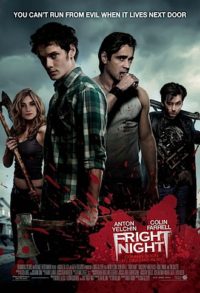 “Not terrible” is my verdict on the new Fright Night which stars Colin Farrell as the vampire who moves in to the Las Vegas suburbs and starts eating the neighbours. The social subtext isn’t far from the surface, the scary bits are much more effective than cheap trash like Paranormal Activity and there’s an interesting cast including former Dr Who David Tennant as a wasted casino conjuror. I was particularly taken with Imogen Poots as the hero’s girlfriend and, if IMDb counts for anything, she is going places.
“Not terrible” is my verdict on the new Fright Night which stars Colin Farrell as the vampire who moves in to the Las Vegas suburbs and starts eating the neighbours. The social subtext isn’t far from the surface, the scary bits are much more effective than cheap trash like Paranormal Activity and there’s an interesting cast including former Dr Who David Tennant as a wasted casino conjuror. I was particularly taken with Imogen Poots as the hero’s girlfriend and, if IMDb counts for anything, she is going places.
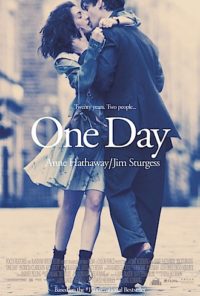 The new Anne Hathaway vehicle, One Day, is an interesting failure. Adapted from a bestselling novel – with the financial support of the publisher which is a new wrinkle – about an almost 20 year friendship that turns into true love. The biggest problem is that, despite Hathaway being the story’s most appealing character and the stronger actor of the couple, it isn’t really about her which means she spends too long off screen.
The new Anne Hathaway vehicle, One Day, is an interesting failure. Adapted from a bestselling novel – with the financial support of the publisher which is a new wrinkle – about an almost 20 year friendship that turns into true love. The biggest problem is that, despite Hathaway being the story’s most appealing character and the stronger actor of the couple, it isn’t really about her which means she spends too long off screen.
The guy in the relationship – played by Jim Sturgess from Across the Universe – is an unattractive, self-involved, over-entitled, public school rich kid who spends far too much of the film feeling sorry for himself. It doesn’t help that Sturgess hasn’t got the acting chops nor looks old enough for the twenty years older scenes.
The film also wastes three usually awesome female actors: Patricia Clarkson (whose English accent is faultess unlike Ms Hathaway’s), Jodie Whittaker (from Venus) and Romola Garai (Atonement). Perhaps One Day might have been better balanced as a TV series?
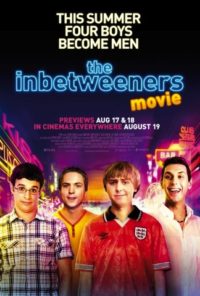 I wish The Inbetweeners Movie had stayed as a TV show. Then I would have been able to remain blissfully ignorant of its existence. Instead, I was forced to sit through an hour of puerile, inane, insulting, vile attempts at humour about the ghastly British abroad. This, friends, is why we should hope that New Zealand doesn’t get much warmer as a result of climate change. We really don’t want to become a holiday destination for fun-loving, booze-hungry, sex-crazed, teenage Poms.
I wish The Inbetweeners Movie had stayed as a TV show. Then I would have been able to remain blissfully ignorant of its existence. Instead, I was forced to sit through an hour of puerile, inane, insulting, vile attempts at humour about the ghastly British abroad. This, friends, is why we should hope that New Zealand doesn’t get much warmer as a result of climate change. We really don’t want to become a holiday destination for fun-loving, booze-hungry, sex-crazed, teenage Poms.
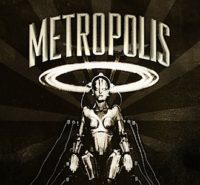 Since the Embassy refurb robbed us of the orchestra pit we haven’t had much in the way silent movie action in town. The NZSO are fixing that this weekend with a special one-off screening of Fritz Lang’s Metropolis with the full orchestra playing Gottfried Huppertz’ original 1927 score. A must-see for all film fans.
Since the Embassy refurb robbed us of the orchestra pit we haven’t had much in the way silent movie action in town. The NZSO are fixing that this weekend with a special one-off screening of Fritz Lang’s Metropolis with the full orchestra playing Gottfried Huppertz’ original 1927 score. A must-see for all film fans.
Printed in Wellington’s Capital Times on Wednesday 2 November, 2011.

